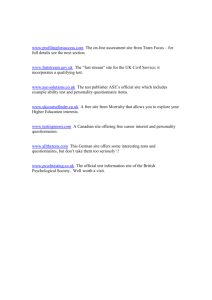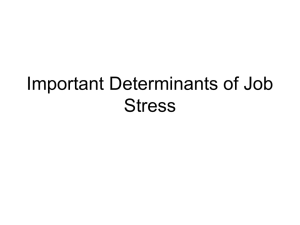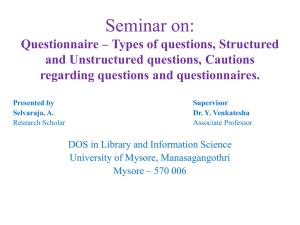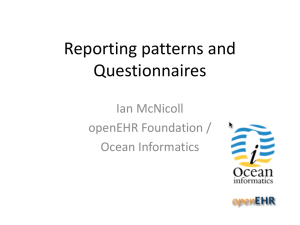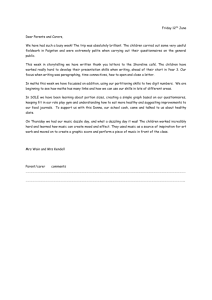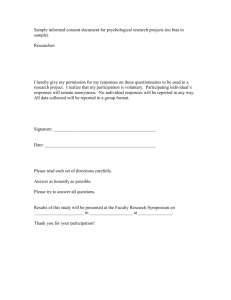questionnaires: some advantages and disadvantages
advertisement
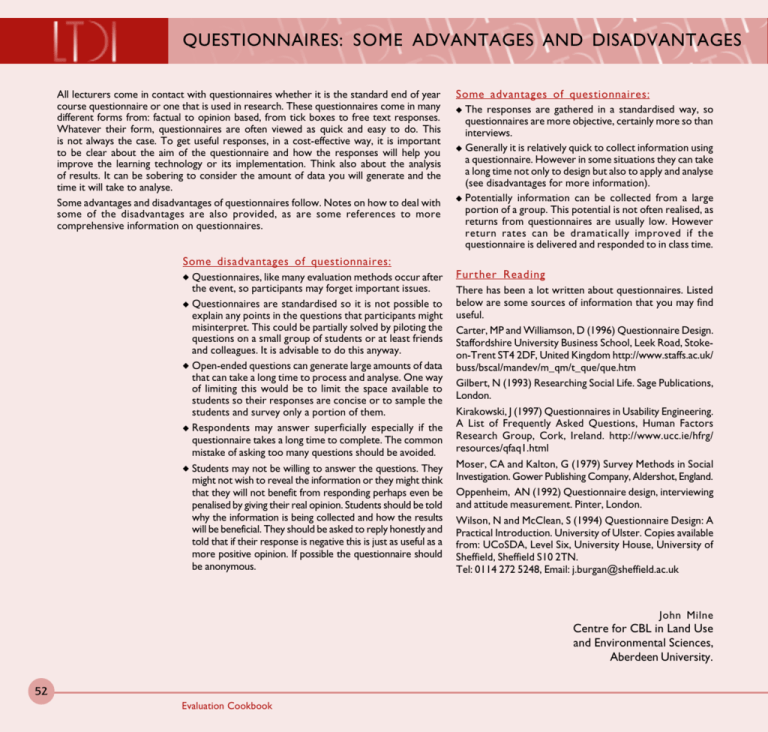
QUESTIONNAIRES: SOME ADVANTAGES AND DISADVANTAGES All lecturers come in contact with questionnaires whether it is the standard end of year course questionnaire or one that is used in research. These questionnaires come in many different forms from: factual to opinion based, from tick boxes to free text responses. Whatever their form, questionnaires are often viewed as quick and easy to do. This is not always the case. To get useful responses, in a cost-effective way, it is important to be clear about the aim of the questionnaire and how the responses will help you improve the learning technology or its implementation. Think also about the analysis of results. It can be sobering to consider the amount of data you will generate and the time it will take to analyse. Some advantages and disadvantages of questionnaires follow. Notes on how to deal with some of the disadvantages are also provided, as are some references to more comprehensive information on questionnaires. Some disadvantages of questionnaires: Questionnaires, like many evaluation methods occur after the event, so participants may forget important issues. ◆ Questionnaires are standardised so it is not possible to explain any points in the questions that participants might misinterpret. This could be partially solved by piloting the questions on a small group of students or at least friends and colleagues. It is advisable to do this anyway. ◆ Open-ended questions can generate large amounts of data that can take a long time to process and analyse. One way of limiting this would be to limit the space available to students so their responses are concise or to sample the students and survey only a portion of them. ◆ Respondents may answer superficially especially if the questionnaire takes a long time to complete. The common mistake of asking too many questions should be avoided. ◆ Students may not be willing to answer the questions. They might not wish to reveal the information or they might think that they will not benefit from responding perhaps even be penalised by giving their real opinion. Students should be told why the information is being collected and how the results will be beneficial. They should be asked to reply honestly and told that if their response is negative this is just as useful as a more positive opinion. If possible the questionnaire should be anonymous. ◆ Some advantages of questionnaires: The responses are gathered in a standardised way, so questionnaires are more objective, certainly more so than interviews. ◆ Generally it is relatively quick to collect information using a questionnaire. However in some situations they can take a long time not only to design but also to apply and analyse (see disadvantages for more information). ◆ Potentially information can be collected from a large portion of a group. This potential is not often realised, as returns from questionnaires are usually low. However return rates can be dramatically improved if the questionnaire is delivered and responded to in class time. ◆ Further Reading There has been a lot written about questionnaires. Listed below are some sources of information that you may find useful. Carter, MP and Williamson, D (1996) Questionnaire Design. Staffordshire University Business School, Leek Road, Stokeon-Trent ST4 2DF, United Kingdom http://www.staffs.ac.uk/ buss/bscal/mandev/m_qm/t_que/que.htm Gilbert, N (1993) Researching Social Life. Sage Publications, London. Kirakowski, J (1997) Questionnaires in Usability Engineering. A List of Frequently Asked Questions, Human Factors Research Group, Cork, Ireland. http://www.ucc.ie/hfrg/ resources/qfaq1.html Moser, CA and Kalton, G (1979) Survey Methods in Social Investigation. Gower Publishing Company, Aldershot, England. Oppenheim, AN (1992) Questionnaire design, interviewing and attitude measurement. Pinter, London. Wilson, N and McClean, S (1994) Questionnaire Design: A Practical Introduction. University of Ulster. Copies available from: UCoSDA, Level Six, University House, University of Sheffield, Sheffield S10 2TN. Tel: 0114 272 5248, Email: j.burgan@sheffield.ac.uk John Milne Centre for CBL in Land Use and Environmental Sciences, Aberdeen University. 52 Evaluation Cookbook
